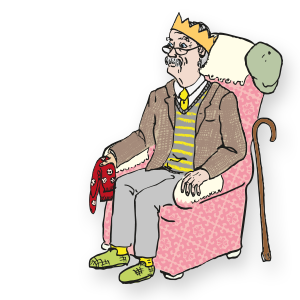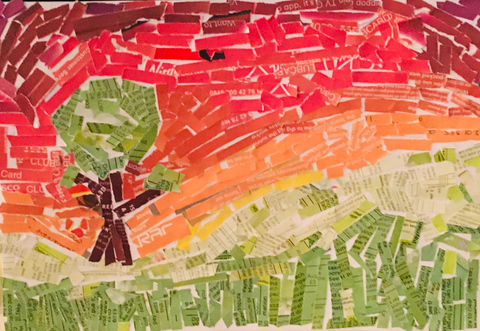

Don’t forget the fun…

Written by Deborah Stephenson
“We don’t stop playing because we grow old; we grow old because we stop playing.” - George Bernard Shaw
’Tis the season to be jolly… and goodness knows, we need it this year, but it’s hard to be jolly or to summon the energy for fun when we feel worn down and weary.
There’s a general feeling that in the current situation that Christmas won’t be the same this year, with a whole raft of changes and disappointments but I’m mindful that it’s not just the pandemic that might make this time difficult. As a friend of mine remarked recently “we mustn’t forget it’s not the only tough thing around,” and she’s right; all the very real and general human difficulties of sickness, bereavement, job loss, family break ups (to name just a few), continue alongside this additional threat.
Despite that, what we all need right now is a big dollop of fun, oh yes it is… oh no it’s not… oh yes it is…(sorry…) and, as you roll your eyes and sigh, thinking “yes well that would be nice but I’ve got too much to do/I don’t feel like it/I haven’t got time” or all of those, I take that on board … but I’m deadly serious about this fun thing. It’s important. Having fun affects more than just our immediate happiness, and the benefits are broader and longer lasting than you might imagine.
Let’s go straight to the science bit… It won’t surprise you that when we enjoy ourselves the “happy” hormones (serotonin, dopamine and endorphins) are released, balancing out the stress hormone cortisol, reducing the stress and anxiety it causes. Less cortisol leads to better sleep, and on that subject, scientists now believe that biologically, fun and play are equally as important to us as sleep and dreaming which is interesting.
Fun and play challenge the brain making it more flexible. Fun can improve language skills and even our maths, and there is no doubt that it boosts our energy levels, our creativity and productivity, which is why creative companies like LEGO make such an effort to provide a bright and fun working environment.
It doesn’t stop there…. in the long term, reducing cortisol helps to prevent illnesses like high blood pressure and heart disease. Enjoying ourselves creates positive neural pathways and I was interested to read that scientists are studying whether a playful and fun attitude to life can also help delay cognitive decline.
Psychologists believe that play and fun are crucial, especially as we get older, and an article from the John Hopkins University says “Play might just be the most important act we can engage in.”
Convinced yet?
I wonder if we all need to give serious consideration to the priority we give to fun. Far from dismissing it as a “nice to have”… we should stick it right at the top of our list!
Kids are really good at this aren’t they - it’s instinctive, runs alongside everything else, and isn’t put on hold. What I love is their ability to find fun in ordinary things. Wrapping paper tubes and wooden spoons are instant lightsabers for my 13 year old, swooshed in wide loops around his body, riskily near posh glasses (or his sister), and a satsuma can be tossed over a light fitting and “basket balled” back into the fruit bowl. Unplanned, spontaneous and without thought (which does of course occasionally lead to mistakes … ) but on the whole just fun.
My daughter, imagines smily faces in her cereal and crouching cats in her bath bubbles, and after dinner last weekend she began an impromptu uncooked spaghetti duel with her brother. After just a few minutes they had created rules of engagement (including a neat little bow before and after bouts) and a points system, resulting in a lot of fun, squeals of laughter, and tiny bits of snapped spaghetti all over the floor.
I’m not saying that children enjoy everything course, but they gravitate towards fun if there is any to be had.
So what happens to us as we get older? Where does this natural enjoyment go?
For many of us I suppose, “grown-up” equals “serious”. We get self conscious, and become embarrassed more easily. We don’t want to look silly and that squashes the freedom of play.
On a practical level, responsibilities change - we are busy working, looking after and providing for our families. We see “ideal” images of how we should live and fill our lives with things we feel we ought to be doing, beating ourselves up if they don’t go quite right. We become preoccupied, anxious and stressed, and fun is relegated to something we do when everything else is sorted, or on special occasions.
As our responsibilities, increase, we also become more risk averse… understanding the consequences of, for example, the son, with the wrapping tube lightsaber, in the kitchen, with a hot pan - which sounds like a strange game of Cluedo but could end up quite nasty. We predict worst case scenarios (which is healthy to a point) but as fun often has an element of jeopardy (which is what makes it feel exciting and energising), we transform into the fun police … “be careful”, “watch out”, “put it down”, “mind your head/fingers/sister/the cat…”, (aside from which, there isn’t time for a trip to A&E).
We are also affected by general negativity in the news, on TV, and through social media, which is particularly relevant at the moment, and we feel guilty about enjoying ourselves if we know others are unhappy, anxious or lonely.
Given all that, it’s not surprising that fun can feel so far away, but whatever the reason, given the huge benefits it can bring, we probably need to give it a higher priority. Before you start worrying or feeling the pressure to plan loads of activities, I don’t think you have to - it’s more about remembering, and noticing when we can bring a more playful and fun attitude to the usual things we do.
The good news is that once we have fired the fun hormones, it encourage us to seek more fun to fire them again, repeating the benefits, allowing us to enjoy more things, suppressing stress and fear, and so it goes on in a lovely spiral, and when we play, we become actively involved helping us lose self consciousness and embarrassment.
The other brilliant thing about fun is that it also affects the people around us and it encourages them to have fun too which in turn will be good for them…. what better gift can you give at this time?
And there’s something else too…
Something is nagging me as I write… with more people potentially on their own this year can we have fun by ourselves?
The answer has to be yes…
Well who hasn’t turned the radio up loudly and danced round the kitchen when no one else is watching? I’m not being flippant… It doesn’t matter who you are or how old you are, we all have playfulness inside just desperate to get out. Why not go the whole hog… air guitar your frying pan or sing into a spatular for an impromptu karaoke… if music’s not your thing then slam dunk a satsuma, see how it makes you feel.
But seriously, on our own or not, give some thought to the things that bring us enjoyment. What did we used to find fun? We might not be able to do in the same way for all kinds of reasons, but can you adapt them to life now?
Switch the mindset from I shouldn’t or can’t to “Why not!”.
And now I’m off to practice some lightsabering with the roll of turkey foil…!
Deborah Stephenson, soon to be Ollie Coach
I am an Ollie School trainee and a Director at an Independent Prep School for boys. I am a trained journalist and worked in BBC Local Radio for more than twenty years as a reporter, bulletin reader, news editor and programme maker. It was a great job, but I wanted to do something to support my own children’s wellbeing with a view to taking that on to support others and, in pursuit of a better work life balance, I resigned as the Assistant Editor of BBC Essex last year. Inspired by the Ollie School concept I was excited to be accepted for the training course and it has been a fascinating and enlightening and journey so far.
To get in contact with Deborah, email info@ollieandhissuperpowers.com

